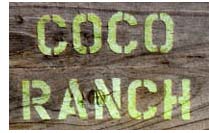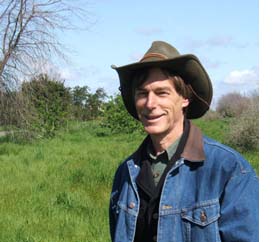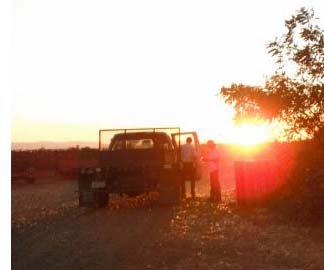Coco Ranch
- By Pia Hinckle
- Reading Time: 3 mins.
Coco Ranch in Davis, California is a labor of love for the House Family. Jennifer and Greg House met at the University of California Davis where they were both studying agriculture. Their certified organic farm grows apples, cherries, apricots, peaches, and other delights such as flowers and tomatoes.

Greg named his favorite tomato “Coco’s Little Sweet Pear” for Jennifer, who goes by the nickname “Coco.” Greg developed this variety especially for the sunny and hot location of the 40-acre farm on the fertile banks of the Putah Creek in Solano County, located between Davis and Winters, CA. A family-heirloom tomato of the Italian plum-type, it has all the characteristics he values: high solids, high sugar, high acid, high lycopene, with a superior deep rich true-tomato flavor. Coco says CLSP is “a true multi-purpose tomato, its exceptionally high solids make for a hearty tomato experience, quick preparation, and a stability that chefs appreciate. It excels sliced or quickly sautéed.”

A long-time organic farmer who is particularly fond of growing and eating apples and tomatoes, Greg was involved in the evolution of the California Certified Organic Farmers (CCOF), the creation of California’s state organic standards, and the federal USDA’s National Organic Program. He was instrumental in developing a standard protocol for growing apples organically.
Want farm-fresh fruit?
We've got you covered.
Greg met Coco in pomology class at the UC Davis and, she says, wooed her successfully with his fine cooking. After two decades of leasing farmland, Greg and Coco were finally able to purchase their own farm in 1996. Greg and Henry, their son, named the farm Coco Ranch, because, as Greg says, “you can’t grow good fruit without honoring the feminine.”
In 2007, Jennifer started “Ethnobotanical Traditions,” a plant study group that seeks to explore the relationships between people, food, medicine, and the land. This is just one of many projects the couple oversees, including a farm management business that helps small farms convert to organic methods and working with towns to preserve agricultural land.

As a family farm, the Houses are on the front line on global warming. They say that over the years they have seen a shift in weather patterns that they now believe is permanent. They have experienced “many weather severities, from excessive spring rain that prevented pollination and caused fungal diseases we have never before encountered, to excessive summer heat that cooked apples on the tree, to unseasonal gale-force winds that blew immature fruit off the tree,” they write on their website. We have come to the point that we feel the weather is no longer dependable. We are expecting severe weather anomalies from now on, and suggest you do too.”
They are also concerned with the loss of farming as a vocation and where the next generation will come from. “The knowledge of what to do in farming and when to do it is dying out at a very difficult time for humanity,” they note. “It is time to really think about what our culture expects farmers to do to provide us with food—sort, cull, deliver, distribute, box, store, process, promote, educate, entertain. And it is time to think about which of these things you can do for yourself, for others, and for the farmer. For if we cannot provide a culture that sustains farmers, then farms are not sustainable as providers of food. And what will we eat?”
Want farm-fresh fruit?
We've got you covered.
__________
Here are some Apple Storage Tips from Coco Ranch.


